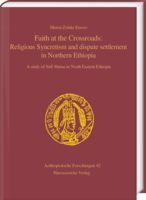|
|
more titles of the subject:
Download:
Please note: With adding digital Products to your cart
the payment will be handled via PayPal. The download will be provided after the payment is confirmed. Based on Meron Zeleke Eresso’s PhD project carried out from 2008 until 2010 at an Islamic Sufi shrine of Teru Sina in northern Ethiopia, this volume presents the syncretic elements of religious practices at the contemporary Islamic shrine, where elements from Christianity, Islam and Traditional Religion are brought together. It discusses the changing nature of religiosity in the first and second generations of the shrine by examining the different factors that have accounted for the formation of syncretic religious elements. Furthermore, it analyzes how these elements are reflected in the dispute settlement process of a faith-based court, yäšeykoc celot, held regularly at the shrine.
Against the backdrop of the complex blending of various religious traditions, the first part of the book examines the formation of syncretic religious practice. The second part presents how these practices are reflected or mirrored in the dispute settlement process of yäšeykoc celot. The book is a useful complement to the existing academic analyses in the fields of anthropology, religious studies and sociology of religion. It is also an addition to the theoretical discussion in legal anthropology and to discussions pertaining to legal pluralism. |
|||||||||||||||||||||||||||||||||||||||||






